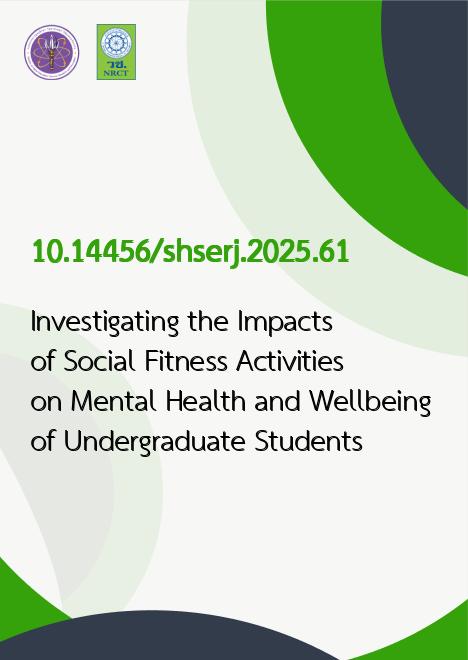
|
Investigating the Impacts of Social Fitness Activities on Mental Health and Wellbeing of Undergraduate Students |
|---|---|
| รหัสดีโอไอ | |
| Creator | Onouma Thummapol |
| Title | Investigating the Impacts of Social Fitness Activities on Mental Health and Wellbeing of Undergraduate Students |
| Contributor | Siraporn Silphipat, Donlaporn Tunthanongsakkul, Nuchanart Cholkongka |
| Publisher | Assumption University Press |
| Publication Year | 2568 |
| Journal Title | The Scholar: Human Sciences |
| Journal Vol. | 17 |
| Journal No. | 2 |
| Page no. | 325-332 |
| Keyword | Social Fitness, Mental Health, Wellbeing, Social Resilience, Social engagement |
| URL Website | https://assumptionjournal.au.edu/index.php/Scholar/article/view/9165 |
| Website title | https://assumptionjournal.au.edu/index.php/Scholar |
| ISSN | 2586-9388 |
| Abstract | Social fitness, defined as the ability to build and maintain meaningful social relationships, plays a crucial role in mental health and wellbeing. This study examines the impact of social fitness activities on the mental health of undergraduate students using a pre-posttest design. A total of 46 university students participated in a 15-week social fitness intervention integrated into a free elective course. The intervention included structured activities such as teamwork exercises, peer discussions, role-playing, and community engagement initiatives aimed at enhancing social connections, skills, engagement, and resilience. Mental health was assessed using the General Health Questionnaire (GHQ-12), while social fitness was measured across four domains: social connection and support networks, social skills and competence, social engagement and inclusion, and social resilience and satisfaction. Results revealed a significant reduction in psychological distress (p < .002) and notable improvements in social connection (p < .001), social engagement (p < .003), and social resilience (p < .002). However, social skills and competence did not show significant change (p = .50), indicating the need for more targeted or long-term interventions. These findings underscore the importance of structured social fitness programs in promoting psychological well-being and highlight the need for sustained and specialized training to enhance social competencies among students. |
